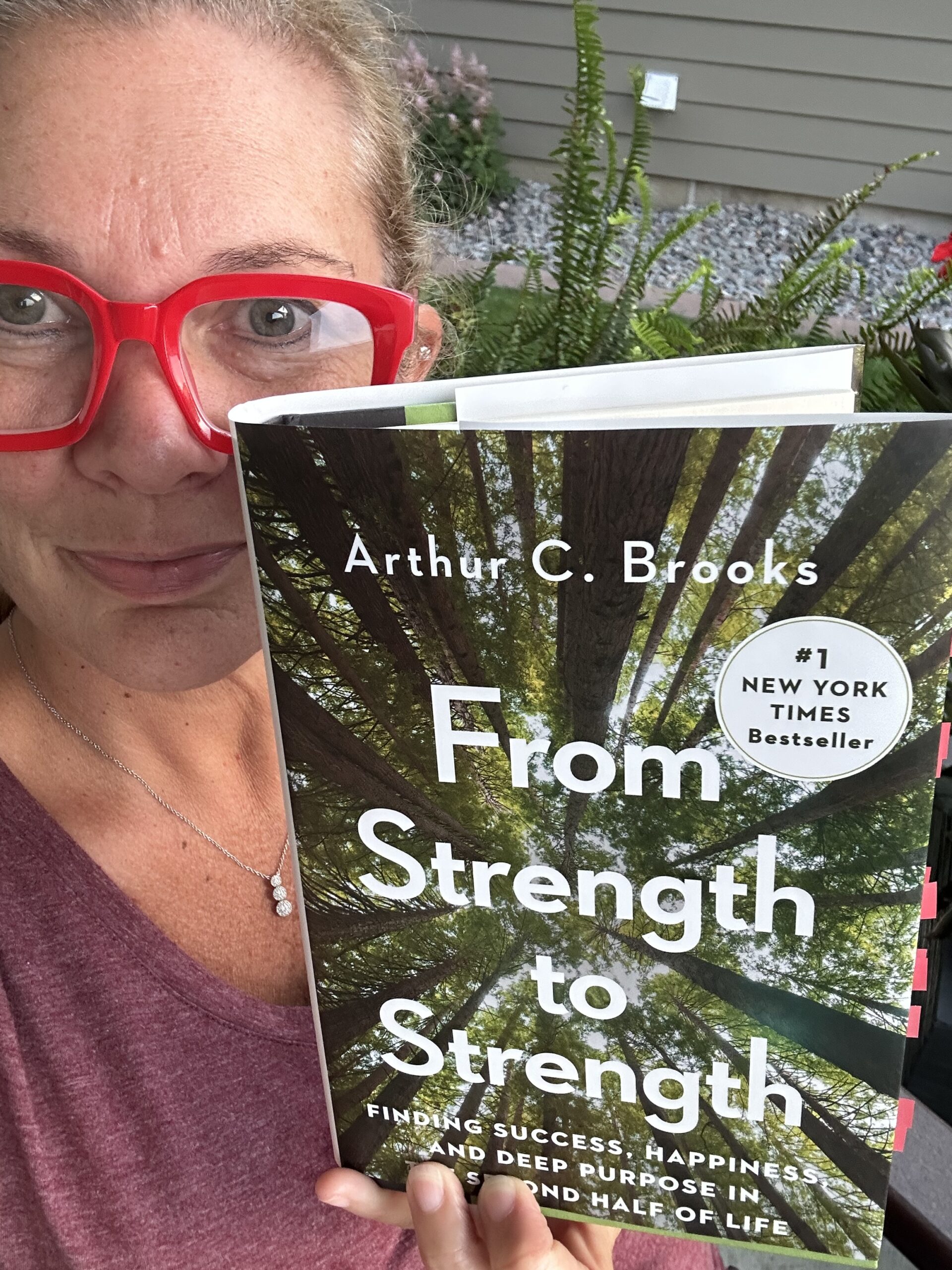I recently turned 50. That milestone alone was enough to stir some deep reflection—but when my mom passed away in June, it pushed me even further inward, asking big questions about success, purpose, and what truly matters.
Interestingly, From Strength to Strength by Arthur C. Brooks was already on my reading list. It had been selected as the July pick for the Glass Ceiling Foundation book club, which meets tomorrow, July 31. We chose the book in early June, before my mom passed. But in the weeks that followed, the timing felt almost uncanny. It was exactly the message I needed.
Are We Really Declining?
The book explores something many of us don’t want to admit: decline sets in earlier than we think. Especially for those of us in idea-driven careers, we assume we’ll keep peaking into our seventies. Brooks suggests otherwise. And not in a grim way, but in a freeing one.
One of the first moments that hit me was his assertion that satisfaction from success lasts but an instant. I felt that deeply. My former life in marketing and sales was a constant loop of high-stakes wins followed by the inevitable crash. Close a big deal? You had 48 hours (if that) to celebrate before it was on to the next one. The adrenaline rush never lasted, and eventually, I realized it wasn’t sustainable.
What changed everything was shifting careers in 2023. I walked away from chasing quotas and instead leaned into something I truly love. Writing. With Copywriting For You, I’ve built a business around using crystallized intelligence. Brooks defines this as the wisdom and knowledge I’ve gained through decades of experience. Now I write SEO-optimized content, I coach clients, and I write books. It’s a new kind of success: more grounded and far more fulfilling.
The Productivity Conundrum
Brooks talks about the illusion of productivity, the belief that working more automatically means achieving more. I’ve lived this. As an executive, I was always “on.” So was my ex-husband. Our long hours eventually created a chasm between us, and between him and our kids.
The paycheck was good. But what did we lose? To support this idea, I came across research from Stanford University showing that working 60-hour workweeks is actually less productive than working 40. The longer the hours, the less efficient we become due to fatigue, stress, and burnout. It validated what I already knew from experience: more isn’t always better.
Always Comparing to Others
There’s a line in the book that made me stop: We love the image of ourselves as successful, not ourselves in true life. That stings, doesn’t it? And social media doesn’t help. I’m on Instagram daily, for books, for business, for visibility. And yes, I compare. I see authors with more followers, more reviews, more book deals. It’s hard not to fall into that trap.
But comparison is the enemy of peace. I know this now. I used to have “everything.” A beautiful lake house in northern Minnesota, snowmobiles, jet skis, the BMW. After the divorce, most of it was gone. And while I’d be lying if I said I didn’t miss the lake house, I can say with full honesty that I don’t miss the rest. I’ve come to understand that experiences with the people I love are worth more than anything I could accumulate.
My ex was always chasing the next thing. Achieving one goal just meant he needed another. Brooks calls this the hedonic treadmill. We mistake more for better. But more doesn’t last. What does? Time. Friendship. Love.
And on that note, Brooks reminded me that good relationships keep us happier and healthier. My first marriage lacked that true friendship. My current one doesn’t. My husband now is my best friend. My partner. I often wish we had met earlier, but I believe everything happens when it’s supposed to. Without my first marriage, I wouldn’t have my two incredible children. Life has a way of stitching the pieces together.
Calling on Faith
The book also explores our faith. I was raised Lutheran, and my belief in God is still strong, though now it’s more personal, less public. I talk to Him often. In quiet moments. In pain. In gratitude. It’s helped me through loss and hardship in ways I can’t quite explain.
And that brings me to my mom. Losing her is something I’m still working through. Grief sneaks up on me in unexpected moments. Just last night as I was finishing up the last few chapters of the book, a dragonfly landed on my toe. It was brief, but it made me think of my mom. Maybe she sent that dragonfly to let me know she’s still here.
And her legacy continues, especially through her love of quilting. Since her passing, my family and I have gifted dozens of her quilts and donated hundreds of pounds of fabric. It feels like we’re honoring her with every stitch passed forward.
Who Do I Want to Be?
Brooks poses a powerful question: Which type of person do you want to be? One who declines privately and quietly suffers? Or one who acknowledges change, keeps loving, keeps believing, and keeps showing up?
I know my answer.
I may not have the lake house anymore, but I have a home. I may not be chasing million-dollar deals, but I have meaningful work. I have love, purpose, friendship, and faith. And for the first time in my life, I’m not chasing the next thing. I’m living in the thing I used to dream about.
Overall, I’d give From Strength to Strength a solid 3.5 to 4 stars. Brooks weaves in insights from a wide range of philosophers, musicians, artists, and historical figures, which adds depth, but for those who aren’t drawn to that kind of reflection, some sections may feel a bit removed.
That said, he also grounds his ideas in the realities of modern life, making the book feel timely and relevant. While some chapters spoke to me more than others, the core message is powerful: the second half of life can be just as meaningful, if not more so, when we let go of the chase and embrace what truly matters.

